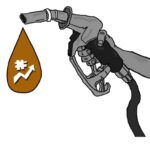The spate of poverty and biting economic hardship in the country has assumed an alarming proportion. The masses are crying blue murder that the President Muhammadu Buhari-led government is responsible for the woe, but in this interview, a member of the House of Representatives for Irewole, Ayedaade and Isakan constituency of Osun State, Taiwo Oluga, absolves the president of blame and suggests ways out of the plight.
It is obvious that poverty and hardship in the country are on the increase. The citizenry, particularly the poor masses, are lamenting that it is biting harder and blaming President Muhammadu Buhari for the situation. What is your take?
There are numerous programmes the government is putting in place at various levels to alleviate poverty and economic hardship, but we are not getting the expected results. The simple reason is that some people given certain responsibilities on programmes and projects don’t do their jobs with sincerity of purpose. That is why hardship persists.
The President Muhammadu Buhari administration is doing a lot to ameliorate poverty and hardship, but the programmes are not affecting the lives of people. For instance, if a poverty alleviation programme is meant for one million people and you gather about 100 people and take their group picture and send to the public domain through the social media to impress, whereas no programme was actually executed, is that genuine?
The message to all leaders is that this is our country. We should be sincere and work with sincerity of purpose, especially those of us handling one programme or another. Those of us that have been committed with programmes should try as much as possible to actualise them with sincerity of purpose.
What is your advice to your colleagues on how to live up to expectations, with a view to ensuring positive impact of governance on the people?
We are lawmakers who are here to represent the interest of our people. We should, therefore, work with sincerity of purpose and ensure adequate oversight. All the committees must work with sincerity of purpose. One of the major roles of the parliament is oversight. All budgets should be appropriated properly. We should ensure judicious use of taxpayers’ money.
Wherever there is a lacuna, we must ensure that it is filled. For instance, when the unlawful exit of the employees of the federal government’s N-Power scheme was discovered, we invited the Minister of Humanitarian Affairs for explanation and discovered that many of them were owed their N30,000 monthly stipends for six months, eight months and more. In any case, they were still going to their places of primary assignments until the portal was closed and they got exited from the scheme after the two-year mandatory period.
What happened was that when the programme was moved to the Ministry of Humanitarian Affairs, there was no communication from the N-Power. The employees didn’t even get any signal that their two-year period of service had expired. But when they cried to us, I moved a motion on the way forward. As a result of our intervention, some of them were called and paid. Whenever we discover anything that can bring down the country, we should speak out.
Insecurity has crept to the South-West, which used to enjoy a bit of relative peace, with banditry, kidnapping, herdsmen menace becoming a recurrent decimal in the region. What do you think should be done to overcome the challenge, not only in the South-West but the entire country?
The way to go about the insecurity crisis in the country is community policing. The insecurity situation is a big challenge and all of us must be involved in proffering solution to it. Community policing is the way to go.
There are killings and maiming everywhere. Innocent citizens are being wasted on a daily basis. We cannot continue like this. We have the right to live, and we must protect ourselves.
The Amotekun security outfit in the South-West must brace up. Also, there is a Joint Task Force (JTF) in the North. Other regions too have their local security outfits. All of them must be in force.
The major role of every government is to ensure security of lives and property. How can we say the constitution does not allow us to set up local security outfits? There is no constitution that cannot be reviewed. Every constitution must reflect the interest of the people. All we need to do is sit down and review the constitution in a way that could address the needs of the people, especially in the area of insecurity, which is the major challenge being faced by the country.
The new Inspector-General of Police, Usman Baba, should sit down with the Attorney-General of the Federation, Abubakar Malami and look at how we can strengthen Amotekun in the South-West, the JTF in the North and other local security agencies in different regions and see how they could be trained and retrained in the effort to proffer solution to the escalating insecurity challenges, especially in rural communities.
You had said you joined politics to assist the vulnerable and make life meaningful to them. To what extent have you lived up to expectations in bringing the dividends of democracy to your constituents?
By the grace of God, my impacts cut across different segments of the society, as well as the people that are meant to be beneficiaries of governance – traditional institution, religious organisations, education sector, the youth, market women etc.
I want to see my constituency taken out of poverty through increased empowerment programmes. To do this, we need to increase their capability and ability and strengthen them financially and economically. My vision is that before my tenure ends in two years time, my constituency and even the state would have been taken out of poverty.
How many bills have you sponsored since you came on board and what are they meant to achieve?
I have about nine bills. It is on record that during the first anniversary of our coming on board as the 9th Assembly, I am among the lawmakers that sponsored the highest number of bills and I thank the Almighty God for the privilege. I have a bill on the establishment of a federal government college of education in Gbongan, I have another one on price control. I have also moved motions. The major one is the one that affected the unlawful exit of N-Power employees from the programme without paying their stipends fully. I spoke on their behalf. I can only expect my constituency to expect more despite that COVID-19 has affected regular sittings to achieve results. We only sit once or twice in a week.
There have been agitations for restructuring of the country as part of efforts to proffer solutions to the socio-political and economic quagmire bedeviling the country. Are you in support of it?
Even if we are going to do restructuring, our leaders should sit down and reason together. We cannot do it with war and rancour. We should sit down and ask ourselves some salient questions: Are we ripe enough as an ethnic group to have our own nation? As it were, we should still see ourselves as one country.
As a female lawmaker, what do you think should be done about gender/domestic violence, especially rape that is becoming rampant?
As a female legislator, I can say that rape is not only a sin against womanhood and humanity but also against God. It has drawn the attention of the lawmakers, even at our state houses of assembly. The punishment being mulled for domestic or gender violence, especially rape, is either death or castration. Whatever religion the culprits practise doesn’t matter and does not justify it. All we know and are saying is that it is a sin against God and we are saying no to it.
The Speaker of the House of Representatives, Femi Gbajabiamila, has spoken to all the speakers of the houses of assembly concerning the rape issue to key into legislation on it because some people may commit the crime in a state and run to another state where there is no legislation against it. But if the law is binding in every state, there won’t be a hiding place for any culprit.

 Join Daily Trust WhatsApp Community For Quick Access To News and Happenings Around You.
Join Daily Trust WhatsApp Community For Quick Access To News and Happenings Around You.


